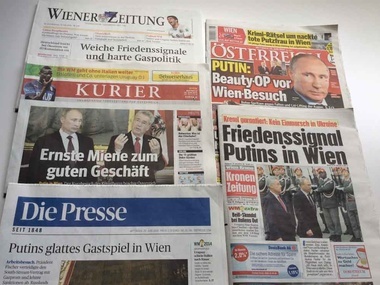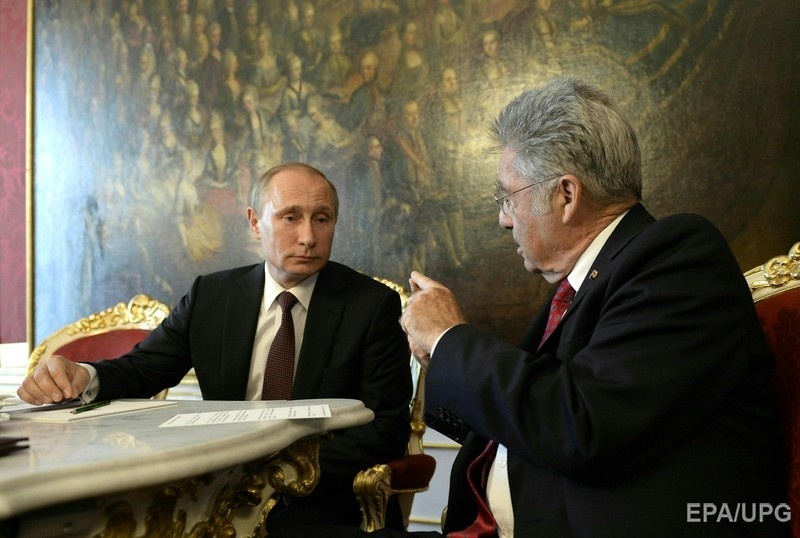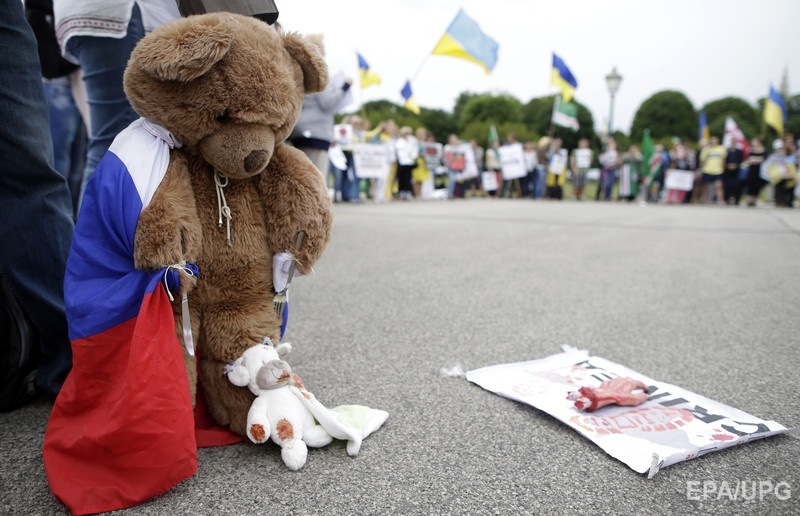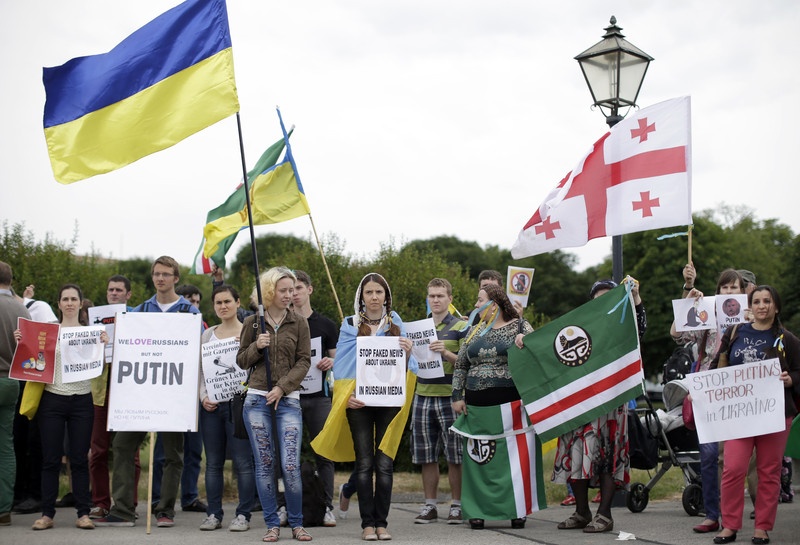At the beautiful blue Danube
Vienna is the capital of a small European country with an impressive imperial history, home to wonderful music; after World War II, it became the headquarters for many international organizations, the centre for making major geopolitical decision and territory for absolutely all European intelligence services. Today, it may be literally called the outpost of diplomatic and informational war for the independence of Ukraine. But this is only true in theory.
Another round-table discussion on cooperation between Ukraine, Russia, and the EU was held in Vienna on January 20. The future of this cooperation was discussed by former Czech President Vaclav Klaus, former President of Ukraine Viktor Yushchenko, and Othmar Karas, Member of the European Parliament and Head of the Delegation of the EU-Russia Parliamentary Cooperation Committee, just to name a few. Claus’ recommendation to the EU to refrain from interfering in the "internal conflict" in Ukraine caused loud applause. The same day, one of the leading Austrian newspapers, Die Presse, published his interview, in which he declared that it was the EU that was responsible for escalating the conflict. He also added that Ukraine is just a passive instrument in the fight of the EU and the USA against Russia, which, certainly, stupefied any sound-minded reader: he literally stated that we allegedly have an internal crisis. This was followed by other "pearls of political wisdom": escalation of conflict after the Maidan and intervention of Russia is just a protective reaction and desire to protect the Russian population against "attacks"; Ukraine is a split, artificially created country; Crimea had never been a part of Ukraine. And again – a wave of approving feedback from online commentators. One feels uneasy when seeing all this: are we really looking for support and solidarity here?
War is war
The Ukrainian Foreign Ministry declared in early December that, despite the scepticism of our fellow citizens, we were not losing the world informational war. How can we agree with that? The EU is losing it, according to the recent statement of several Ministers of Foreign Affairs, and Ukraine is not? It is vexing, but it should be admitted that the public opinion in the EU countries is experiencing most severe pressure of the Russian propaganda and is largely shaped under the influence of anti-Ukrainian messages.
Creation of the Ministry of Informational Policy is evidence to the fact that the leaders of our country finally came to grips with the problem after many years of passive contemplation of the aggressive informational policy of the neighbouring country. It was ironically named Minstets right away. Tasks assigned to the freshly mobilized "fighters of the informational front" are as follows: countering Russia Russian informational aggression; development of the strategy of informational policy and the concept of informational security of Ukraine; coordination of authorities with regard to communication and information dissemination. God, how naive it sounds. We create a whole ministry to resist aggression of one state? How many more professional officials need to be employed for this purpose? Why cannot the Ministry of Education and Science, the Ministry of Culture, the Ministry of Foreign Affairs communicate and disseminate information within the scope of their activities? We will establish a Public Council in addition to Minstets. I would like to see job descriptions and qualification requirements put forward to new figures.
Let us now get back to the war itself.
The nature and methods of the informational warfare were not invented today. Hitler's evil genius surely served as useful methodological material for propagandists all around the world, in the first place for the security services in the USSR and the Russian Federation. His ideas are especially relevant for military propaganda. Here are some of them:
"Any propaganda must be accessible to masses; its level must be based on the level of understanding typical of the most backward individuals from among those who it is intended for. The more people propaganda is intended for, the more elementary its ideological level must be."
"Susceptibility of masses is very limited, their range of understanding is very narrow, but their forgetfulness is great. For this reason alone, if the propaganda wants to be successful, it should be limited to just a few points and state these points briefly and clearly, in the form of catchy slogans, repeating the same thing until even the most backward of the listeners has learnt what we wanted."
Indeed, broad masses have demand for a simplified world image, in which, relatively speaking, everything is either white, or black. Hence, for example, identification of ethnic Russians with Russian-speaking people, Orthodox believers with pro-Russian citizens, etc.
In order to discredit the enemy, propagandists produce massive disinformation, amplifying the influence by multiple repetitions and use of maximum number of channels: TV, Internet, print media.
Memorable emotional verbalization is widely used: "Crimea is ours", "Putin, help!", "Grandfathers were fighting."
In order to promote the necessary ideas, authors of the informational materials appeal to public opinion leaders – well-known and respected "experts", influential figures of culture, science, and show business.
Tales and storytellers from the Vienna Woods
Such repeated messages explaining economic and political events and social phenomena are usually called narrative. The term is borrowed from the Soviet fairy tale researcher Propp, and informational influence researchers often use the notion "myth" instead of it.
In its report as of May 2014, the Konrad Adenauer Stiftung dealing with projects aimed "to support democratic development, building of civil society, establishment of free media and consolidation of democratic institutions" presented an exhaustive list of myths of Russian propaganda intended to justify Russia's policy towards Ukraine. The report is presented in German, so it will useful to cite it here in short (all these tales are certainly familiar to the readers):
1. "The West interfered with the internal affairs of Ukraine, organized and directed protests on the Maidan by means of fascist groups."
2. "The transitional government in Kiev came to power as a result of a coup and is illegitimate."
3. "Ethnic Russians mostly living in eastern and southern Ukraine are discriminated and harassed by the transitional government and fascist groups."
4. "Speaking about the armed separatists in the south and east of Ukraine, these are forces of self-defence who want to join the Russian Federation."
5. "Kiev government is fighting against its own population in the east of the country and suppresses peaceful protests."
6. "Owing to common history as well as ethnic and cultural ties, Ukraine is a natural area of Russian influence, therefore it can enjoy only limited sovereignty."
7. "The right to self-determination of peoples and the referendums held legitimize separation of the Crimea and other territories and their entry into the Russian Federation."
8. "The West uses double standards in assessing the situation in Kosovo and the Crimea."
9. "After the collapse of the Soviet Union, the West has conducted a system policy of repression and weakening of Russia."
10. "Despite previous promises, the NATO has expanded its territory to post-Soviet regions, it is committed to Ukraine’s acceding to it and thus infringes upon the security interests of the Russian Federation."
Amazingly cynical misrepresentation of reality.
Martin Pollack, a famous Austrian publicist, notes that the Austrians have "fundamental unawareness concerning Ukraine." Of course, this fact simplifies the task of public opinion manipulators: it is much easier to create whatever image in the eyes of ignorant people, and the statement about the "artificiality" of such a public structure as Ukraine given in the beginning of the article and favourably received by the Austrian audience is evidence of this. Broad masses are not particularly eager to verify misinformation fed to them – they swallow the finished product.
The changing political and economic situation leads to the fact that the Kremlin propagandists gradually change the narrative. And there is no denying the professionalism of our opponents: unlike our "fighters", they have a very good command of both theory and practice. One of the rules of the informational warfare is compulsory analysis of the vulnerability of the target audience: what does it responds to? how does it respond? how can it be affected and forced to change opinions, attitudes, and behaviour?
Below are some other "fairy tales" about Ukraine widely spread in Austria:
- there is no single nation, there are Western Ukraine (former Galicia, part of the Austro-Hungarian Empire) and Eastern Ukraine (former Soviet Union or Russia);
- Novorossiya is a historical term; its territory coincides with all eastern and southern regions;
- Those who criticize Putin's policy are Russophobes, "American lackeys" and fascists (it is somehow forgotten that ultra-right marginal groups all around Europe are Putin's best friends);
- Ukrainian oligarchs are fighting for the spheres of influence, and Austria should not interfere in the conflict;
- Austria should not sacrifice its long-term and extensive connections with Russia for the sake of Ukraine (which is not quite a state but a strange corrupt formation);
- The West (US and EU) are fighting against Russia, while Ukraine is a passive tool in this fight;
- Sanctions against Russia are not effective and do harm to the Austrian economy.
The last statement has altogether become the favourite slogan of the top management of the country, including the Federal President Fischer and the Federal Chancellor Faymann; it is mentioned in all their interviews.
The general tendency for the Austrian society is to insist on non-interference in the "Ukrainian crisis"
Generally, these ideas can be called neither consistent nor logical. They are used to influence different target audiences: the simpler and more naive the audience, the more cynical and stupid the narrative.
Conductors of these ideas are different "experts" and other opinion leaders. The experts mainly include representatives of academic circles involved in research in the field of political science and sociology. Economic issues are mainly commented by representatives of Austrian business and industry. Politicians and diplomats are another group of regular participants of various public debates.
Scientists are the group that is most resistant to the temptation to be "in trend" regarding interpretation of the situation in Ukraine. They try to explain events objectively, owing to their academic affiliation they do not juggle with facts, they do not manipulate with figures, they try to give rational rather than emotional arguments for their points of view. Unfortunately, they are in the minority. They understand that Russia is waging war against Ukraine, they are aware of the Maidan values, multiculturalism, multi-ethnicity, tolerance and bilingualism of Ukrainian society. However, the criticism expressed by them is well supported and justified.
The general trend for the Austrian society is to insist on non-interference in the "Ukrainian crisis", on recognizing ineffectiveness of sanctions and their lifting, on explanation and justification of Putin's policy (a new term was even coined in the German public discourse describing "those who understand Putin", Germ. Putin-Versteher), on emphasizing the advantages of preserving good relations with Russia.
This trend is followed by the representatives of business and politics. There are obvious reasons for this. Politicians must say what their average voter wants to hear, driven by the stereotypes and prejudices towards Ukraine and Ukrainians. Big business that loses lucrative contracts (for example, OMV and Gazprom with their Southern Stream) has also joined this camp.
Correlation of forces is about the same in television broadcasts.
However, these are real public debate with decent audience capable of civilized discussion.
Virtual communication in social networks alarms with its aggressive and openly Ukrainophobic sentiments. Anti-Ukrainian hysteria is unfolding against the background of anti-American hysteria. Scepticism and criticism against the EU and its policy can be added to it.
The interest to the Internet community has not arisen out of idle curiosity. It is well known that the governments of developed countries allocate large budgets for analysing users’ behaviour on the Web. Research has proved that social networks are a powerful tool for shaping public opinion.
Austrian President Heinz Fischer and Russian President Vladimir Putin talk during the meeting in Vienna on June 24, 2014 Photo: EPA
Austrian printed media are weak in covering our events with only a few exceptions
I can refer to the Facebook page of the "Journalist of the Year", the correspondent of ORF (Austrian leading TV channel) in Ukraine Christian Wehrschütz. The virtual identity of Mr. Wehrschütz is somewhat different from his television image and is sometimes characterized by biased coverage of Ukrainian events. For example, it is very amusing when he publishes a fake from "Russia Today" on his page without any comments. His virtual commentators spread it all across the German-language Internet and curse the inhuman junta. Wehrschütz’s Facebook friends hate and despise Ukraine so much that they have even made up German analogues to the nicknames "Porokh", "Yatsik", and "ukry".
There are "experts" in this community of amateurs, too – those who frequently come to Ukraine and are "eyewitnesses" of the events due to personal or professional reasons.
One of such "eyewitnesses" is Mr. Klaus Pridnig, a film producer. According to his statements, "Merkel sponsors neo-Nazis in Ukraine," the government's refusal to pay pensions in the occupied territories is "a classic theft", "people in the Donbas are fighting because they were attacked by right-wing radicals from the National Guard," "neo-Nazis from Svoboda" were in the government for several months, and now there are "neo-Nazis from the Right Sector" there.
It may seem that he is just one of thousands of ignorant howlers. But he is not. Mr. Pridnig emphasizes that he has been living in Kiev for many years, so he knows exactly what is going on there and has every right to educate his countrymen and help reporters. And he has even more rights to spread lies about Ukraine and the nature of the drama unfolding in Donbass because of his agreement with the previous Ukrainian government that – attention! – the State Cinema Agency will partly finance Mr. Pridnig’s film and will give him EUR 700 000 (seven hundred thousand euro) without compensation. However, the new agency has not fulfilled the predecessors’ promise, which enraged Mr. Pridnig because he did not even know who to claim the money from, and even gave an interview out of rage. I think that, perhaps, one should ask the management the State Cinema to give Klaus money, maybe, he will tell the truth. He is sometimes a member of jury of Ukrainian cinema competitions.
It is against the backdrop of misinformation from different sources – not just Russian, as we can see – that the spiral of lies and delusions unwinds.
Austrian print media is weak in covering our events with only a few exceptions. They do not have their own correspondents in Ukraine, the quality of journalism is moderate. Therefore, Wehrschütz, who was mentioned above, has complete monopoly on reporting information, including that from places of military actions. I personally doubt his desire to tell the truth and nothing but the truth, given his personal acquaintance with the terrorists Zakharchenko and Khodakovsky. Rare publications give more or less adequate analysis of events. These are Die Presse, Kurier, Profil who have professional, experienced and knowledgeable political analysts.
In this propagandist war, we are supported either by Austrian citizens who know and truly love Ukraine (diplomats, businessmen, journalists, individual journalists and scholars), or a few activists of the Ukrainian diaspora acting as individuals.
Protests against Russian aggression in Ukraine are periodically held in Austria Photo: EPA
Help yourself
However, the key stakeholders in the public discourse about the Russian aggression against Ukraine should be our diplomats in the territory of Austria: Embassy and Mission of Ukraine to the International Organizations. There are about 30 employees in total in all these companies.
Unfortunately, the Ukrainian Embassy in Austria is still extremely passive in the information war. There are two main reasons for this. From February to December 2014, our office had no head: the former ambassador resigned and the new one has just been appointed. Nobody has worked with the public opinion in terms of coverage nor in terms of interpretation of events. After all, the human resources of the embassy are so weak that it was mentioned even by the most loyal observers. Striking indeed. Well, there is no ambassador, but there is officially appointed acting ambassador. There are employees who must deal with public relations according to their official duties. As the diplomats themselves claim that this system exists to employ relatives and develop indifference and irresponsibility in people. So we create new ministries – we need to employ the unemployed. The acting ones seem to have no work.
Permanent missions to international organizations are Terra incognita. They act as professional intelligence officers: you will never know what they do. The question why they all sit in Vienna is rhetorical. Nobody will answer it – neither Ukrainians nor Austrians. Even Ukrainian journalists working in Vienna speak about it with disappointment.
Of course, in terms of information blitzkrieg, which the Russian Federation has carried out against us since February, the time lost cannot be recalled. Ukraine has been mainly present in the informational space as a subject of discussions for all these months. An official position has not been presented. At the same time, the Russian ambassador, Austrian top managers of Russian companies and other Putin-Versteher were honoured guests in almost all TV programs and debates.
There was neither reaction to these statements or debates on the part of the embassy.
It is natural that the Austrians largely do not know and do not understand us
However, the new Ambassador of Ukraine has finally arrived in Vienna in December and declared his readiness to actively work in the media and other public venues. And this field is a priority for him. We hope that words will be followed by actions. Moreover, that the activity plan is clear: to disprove the myths of Russian propaganda, to inform truthfully and objectively on current events and familiarize the Austrian society with our history, culture, and so on, thus bringing together Ukraine and Austria in the mind of the Austrians.
The second group is activists from the diaspora. As a matter of fact, it is thanks to their efforts for the last 13 months that it was possible to draw public attention to the blatant violation of human rights and freedoms in Ukraine – first by the government of Azarov and Yanukovych, then by the secret services of the Federal Security Service and the Kremlin leaders.
The active part of the small Ukrainian community has held around 100 actions over the past year: pickets, demonstrations, rallies; it took part at least in 10 TV programs, it gave at least 10 interviews to the print and electronic media.
However, prior to the events on the Maidan, the Ukrainian community was a "thing in itself". Events organized by public organizations were primarily aimed at the Ukrainians. They were not interesting for the younger and more active part of Austrian society. The oldest and most respected organization – Austrian-Ukrainian society – seems to be inanimate. The latest news on their website is dated 2012. It is natural that Austrians largely do not know or understand us.
Ukrainian community has held around 100 actions for the previous year Photo: EPA
Diplomats must mobilize themselves and consolidate efforts of active citizens, to organize the work to promote the Ukrainian culture, and to lobby Ukrainian ideas and Ukrainian business.
We need to convince EU partners that Ukraine has great potential for Europe. Our allies must be "those who understand Ukraine." Their efforts united under the auspices of the embassy or non-governmental organizations will help Ukraine to integrate in the common European space – at least from the cultural and informational point of view.
In the context of the protracted armed conflict, Ukraine needs the support of the free world – from financial aid to the supply of arms. Therefore, we just have to win the "cold war" on the Western Front, the war of ideas and information; our struggle must be fair in the eyes of the citizens of the states helping us.
And we will win to the accompaniment of the sounds of the beautiful Viennese waltz.


 +1 Kyiv
+1 Kyiv






